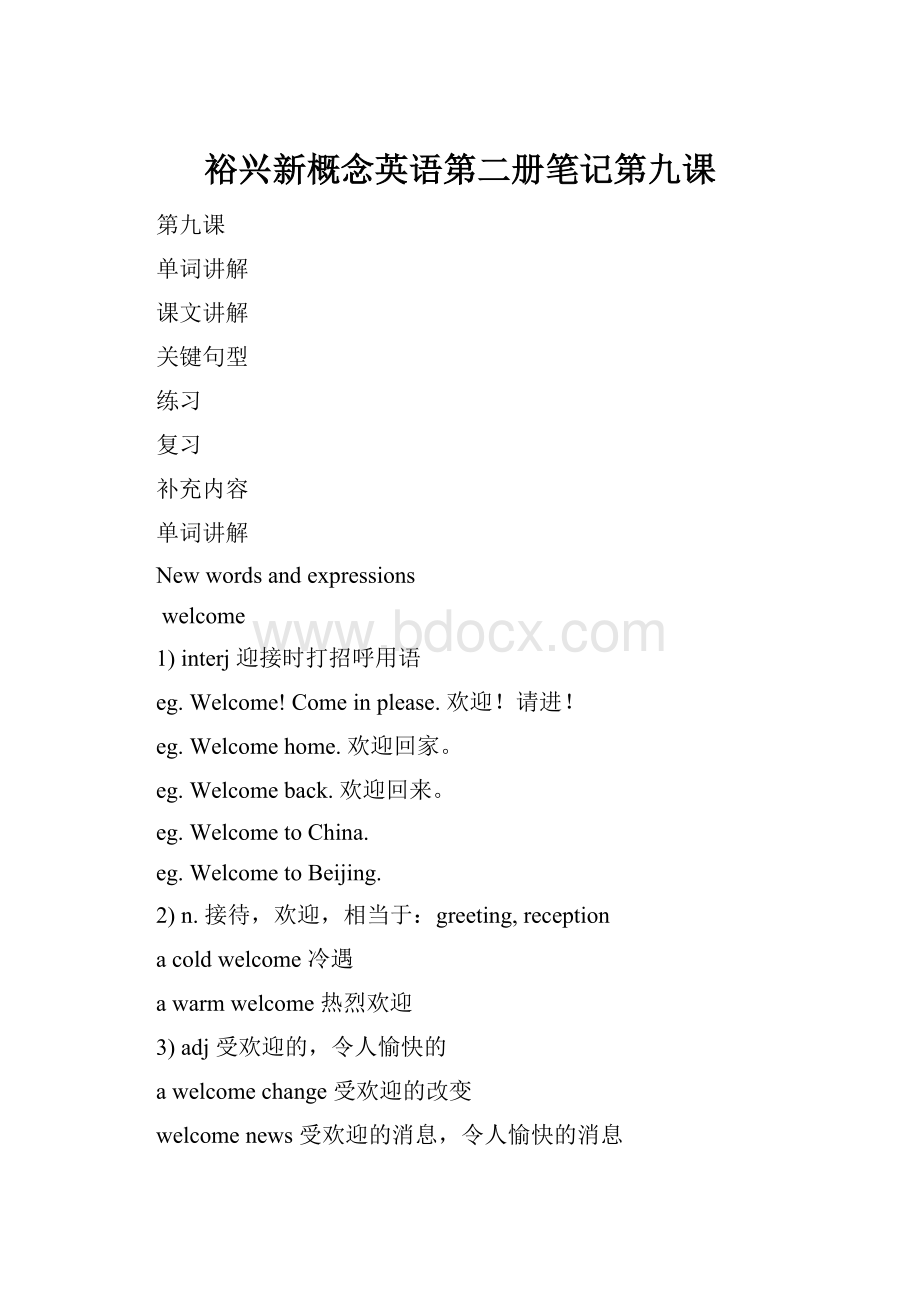裕兴新概念英语第二册笔记第九课.docx
《裕兴新概念英语第二册笔记第九课.docx》由会员分享,可在线阅读,更多相关《裕兴新概念英语第二册笔记第九课.docx(16页珍藏版)》请在冰豆网上搜索。

裕兴新概念英语第二册笔记第九课
第九课
单词讲解
课文讲解
关键句型
练习
复习
补充内容
单词讲解
Newwordsandexpressions
welcome
1)interj迎接时打招呼用语
eg.Welcome!
Comeinplease.欢迎!
请进!
eg.Welcomehome.欢迎回家。
eg.Welcomeback.欢迎回来。
eg.WelcometoChina.
eg.WelcometoBeijing.
2)n.接待,欢迎,相当于:
greeting,reception
acoldwelcome冷遇
awarmwelcome热烈欢迎
3)adj受欢迎的,令人愉快的
awelcomechange受欢迎的改变
welcomenews受欢迎的消息,令人愉快的消息
4)欢迎,迎接(greet)
eg.Theclockrefusedtowelcomethenewyear.大钟拒绝迎接新年。
eg.Thechildrenflewtowelcometheirmother.孩子们飞奔着去迎接妈妈。
5)Youarewelcome.(用作答谢的客套话)
crowdn.alargenumberofpeoplegatheredtogether
thecrowd人们,人群
eg.Hepushedhiswaythroughthecrowd.他挤过人群。
alargecrowdofpeople一大群人
eg.Therewasacrowdof20000peopleatthefootballmatch.在足球赛上有20000多人。
crowdedadj.拥挤的
acrowdedtrain拥挤的火车
crowd(口)伙伴
thecollegecrowd大学同学,大学伙伴
incrowds成群地
raiseoneselfabovethecrowd出类拔萃
gather
1)v.聚集
collecttogether,cometogetherinoneplace
eg.Acrowdsoongathered.一群人立刻聚了起来。
eg.Thecloudsspeedilygatheredagain.很快乌云又密布了。
eg.GatherroundandI'lltellyouasecret.大家聚过来,我告诉你们一个秘密。
2)获知,推测
eg.Igatheredfromherremarksthatshewasn'tsatisfiedwithherjob.
我从她的评论得知她对工作并不满意。
3)把衣服裹在身上
eg.Shegatheredashawlaroundherself.她把披肩围在身上。
shawl[ʃɔ:
l](女用)披肩,围巾
hand
1)手
thebackofthehand手背
lendachildbythehand牵着一个孩子
givesbahand帮某人一个忙
raiseone'shand举手
shakehands握手
waveone'shand挥手
washone'shands洗手;洗手不干
2)指针
theminutehand分钟
thehourhand时针
thesecondhand秒针;二手的
3)方向,侧
eg.Iseeaschoolonmyright/lefthand.我在右/左手边看到一所学校。
ontheonehand,ontheotherhand一方面,另一方面
gettheupperhandof占…上风
handandfoot手脚一起;完全地
tieapersonhand五花大绑
handtohand短兵相接
showone'shand(to)摊牌
onallhands四面八方
shout因愤怒或为引起注意而喊叫
shoutatsb对…大喊大叫(不礼貌)
shouttosb对…大声喊(使听见)
eg.Ihadtoshouttomakemyselfheard.我只得喊,以使大家听见。
cry(痛苦、惊讶等的自然反应)发出尖利的声音
scream(痛苦、恐惧或激动)而喊叫(大而尖利的声音)
refusevt.[ri'fju:
z]
refusesth拒绝
refuseagift拒收礼物
refuseanoffer拒绝给予
refuseaninvitation拒绝邀请
refuseone'shelp拒绝某人帮助
refusetodo拒绝去做
eg.TheclockrefusedtowelcometheNewYear.那只大钟拒绝迎接新年。
eg.Thecarrefusedtostart.这车发动不起来。
eg.Theboyrefusedtolendmehisdictionary这个小孩拒绝借给我字典。
refusesb拒绝某人
eg.Theyrefusedhimadmittance.他们把他拒之门外。
admittance[æd'mɪtns]n.允许进入(或加入)权
refusevt.[ri'fju:
z]
refuse['refju:
s]n.[U]垃圾,废物
excuse[iks'kju:
z](v.)原谅
excuse[iks'kju:
s](n.)借口
accent[æk'sent](v.)重读
accent['æksənt](n.)重音
conduct[kən'dʌkt](v.)指挥,控制
conduct['kɔndʌkt](n.)行为
laughv.笑,大笑
eg.Hewholaughslastlaughsbest.笑在最后,笑得最好。
laughatdanger等闲视之
比较:
laugh笑,大声笑
smile微笑
grin[ɡrin]露齿而笑
guffaw[gə'fɔ:
]捧腹大笑,哄笑,大笑(贬)
sneer[sniə]嘲笑;冷笑
giggle['ɡiɡl]咯咯地笑
chuckle['tʃʌkl]低声吃吃地笑;轻声地笑
laughv.笑,大声笑
laughatsb取笑,讥笑
laughtooneself独自发笑
smileatsb对…微笑
makefunofsb捉弄
can'thelplaughing忍不住大笑起来
can'thelpcrying忍不住放声大哭
laughter['lɑ:
ftə]n.笑,笑声
ahomefulloflaughter充满笑声的一个家庭
laughingadj.快乐的,好笑的
eg.It'snolaughingmatter.这不是什么好笑的事情。
laughingstock笑柄
课文讲解
Text
intheevening
onWednesdayevening
Itwasthelastdayoftheyear可表达为ItwasNewYear'sEve。
alargecrowdofpeople一大群人
or:
alargenumberofpeople;agreatmanypeople
strikestrike----struck-----struck
1)敲,打
striketwelve敲响12点
strikewhiletheironishot.(谚)趁热打铁
2)施以(打击)
eg.Themanstruckhimaheavybox.那人重重地打了他一拳。
3)碰撞
eg.Theshipstruckagainsttherock./Theshipstruckontherock.船撞上了岩石。
4)擦(火柴)
strikeamatch擦火柴
5)突然想到某人、某个主意(occurto)
eg.Agoodideastruckme.相当于:
Agoodideaoccurredtome.
我突然想到一个好主意。
bestruckby被打动
eg.Iwasstruckbyitsbeauty.我被它的美打动。
6)n.罢工
beonstrike在罢工
goonstrike/gooutonstrike举行罢工
intwentyminutes'time在二十分钟后
在将来时态,用in表示一段时间后。
上面还可表达为:
intwentyminutestime
passv.通过,经过,传递
pass----passed----passed
eg.Halfanhourpassed.半小时过去了。
eg.Ipassedtheexameasily.我轻松地通过考试。
eg.Passmethesaltplease.请把盐递给我。
waitedandwaited等啊等
Wewalkedandwaited我们走啊走。
Welaughedandlaughed.我们笑个不停。
happenvi.偶然地发生
eg.Theaccidenthappenedatthestreetcorner.事故发生在这条街上的角落。
happento发生于……身上
eg.Shehopednothingbadwouldhappentohim.她希望没有任何不好的事情发生在他身上。
happentodo偶然做
eg.Ihappenedtoseehimonthestreet.我偶然在大街上碰到他。
ithappensthat…..碰巧,恰好
eg.Itsohappenedthatthefamousactorwasherbrother.碰巧那个著名演员是她哥哥。
=Thefamousactorhappenedtobeherbrother.
takeplace通常指可预见的事
eg.Thecontesttookplaceyesterday.比赛昨天举行。
taketheplaceof代替,接替
eg.I'lltakemyfather'splaceforawhile.我将暂时接替我父亲。
pastprep.经过….;在…..之后
eg.It'sfiveminutespasttwelve.现在12点过5分。
eg.It'sfiveminutespasttwo.已经2点过5分了。
eg.Hewalkedpastme.他经过我身边。
passed[pɑ:
st]与past[pɑ:
st]同音
atthatmoment相当于justas:
正在那时
beginv.开始
begintodo→begindoing开始做某事
eg.Whendiditbegintorain?
什么时候开始下雨的?
→Whendiditbeginraining?
starttodo→startdoing
beginat以…..开头
beginatpage50从50页开始
beginonpage50(美)从50页开始
beginwith以……作为开始
eg.Thestorybeginswiththeaccidentaldeathofamillionaire.
这个故事以一个百万富翁的意外死亡作为开头。
beginby(开始的方式)
eg.Shebeganbytellingajoke.她以讲笑话的方式作为开头。
beginon+着手做的对象
eg.Shebeganontheviolinandlaterchangedtothecello['tʃeləʊ]n.大提琴.
她开始练小提琴后来改为练大提琴。
beginningn.开端
frombeginningtoend从头到尾
fromthebeginning
or;fromtheverybeginning从最开始
very放在名词前起强调作用
inthebeginning
or:
atthebeginning在开始的时候
文中的时间状语及介词的使用
onWednesdayevening在星期三的晚上
intwentyminutes二十分钟后
atfivetotwelve差五分钟十二点
It'stwominutespasttwelve!
已经十二点过二分了!
atthatmoment在那一刻
SpecialDifficulties
对疑问句的两种不同的否定回答:
Isthereanyteainthepot?
Thereisn'tanyteainthepot.
or:
There'snoteainthepot.
Isthereanyoneatthedoor?
Thereisn'tanyoneatthedoor.
or:
There'snooneatthedoor.
Isthereanybodyatthedoor?
Thereisn'tanybodyatthedoor.
or:
There'snobodyatthedoor.
Isthereanythinginthebox.
Thereisn'tanythinginthebox.
or:
There'snothinginthebox.
Didyougoanywhereyesterday?
Ididn'tgoanywhereyesterday.
or:
Iwentnowhereyesterday.
Exercise:
用两种不同的方式来对以下疑问句作出否定回答:
1.Haveyouanymoney?
No,Idon'thaveanymoney.
No,Ihavenomoney.
2.Didyougoanywhereintheholidays?
No,Ididn'tgoanywhereintheholidays.
No,Iwentnowhereintheholidays.
3.Didyoubuyanythingthismorning?
No,Ididn'tbuyanythingthismorning.
No,Iboughtnothingthismorning.
4.Wasthereanybodypresentwhentheaccidenthappened?
No,therewasn'tanybodypresentwhentheaccidenthappened.
No,therewasnobodypresentwhentheaccidenthappened.
Exercise:
用no来改写以下句子
1.Hehasn'tanyhobbies.
Hehasnohobbies.
2.Hedoesnotgoanywhere
Hegoesnowhere.
3.Hedoesnotseeanybody.
Heseesnobody.
4.Heisnotinterestedinanythingexceptfood.
Heisinterestedinnothingexceptfood.
小结:
notany换成no,含义不变。
关键句型
KeyStructures
表时间的介词at,in,on,from,till,during,not…until等用法
at
1)在某时刻,时间之前
Eg.Lunchwasatoneo’clock.
Eg.Whendidyouarrive?
Iarrivedat10o’clock.
2)在固定短语之前
atnight,atnoon,atteatime,atlunchtime,attheweekend…
3)Beforefestivals在节日之前
atChristmas
atEaster(复活节)
in
1)在(一段时间)内
Eg.Thepigeoncoveredthedistancein3minutes.
2)在月,季节,年的前面
Eg.Thatwasin1640.
inspring;insummer;inJuly
3)表“…之后”
Eg.I’llcomebackinadayortwo.
4)固定短语
inthemorning
intheafternoon
intheevening
on
在某一天,某个早上,某天前夕等
Eg.TheyarrivedinShanghaionMay20.
Eg.OntheEveoftheirdeparture,theygaveafarewellbanquet.
在他们告别前夜,他们举办了一个告别宴会。
from..till从…到(from…to)
eg.Theyarebusyfrommorningtillnight.
Theyarebusyfrommorningtonight..
during
1)在某段时间里的不确定时间
eg.Shewokemanytinesduringthenight.
在夜里她醒了很多次。
2)在…的这段时间(贯穿始终)
eg.Theydidn’tsayawordduringthemeal
not…until直到…才(通常动词是个非延续性动词)
eg.Theydidn’tstopuntilaftersixo’clock.
他们直到六点钟才停下来。
after在…之后
eg.Iwantitbackthedayaftertomorrow.
我希望后天能拿回东西。
eg.Itiseasytobewiseaftertheevent..
事后诸葛亮。
Exercise用正确的介词填空:
1)Hehasgoneabroad.Hewillreturn___twoyear’stime.
2)___SaturdaysIalwaysgotothemarket.
3)Inevergotothecinema____theweek.
4)Heranahundredmetres____thirteenseconds.
5)Ican’tseehim___themoment.
I’mbusy.
6)Mybirthdayis____November7th.
Iwasbornin1974.
7)Thedaysareveryshort___December.
8)Wearrived___thevillagelate___night.Weleftearly___themorning.深夜、大清早
9)Ishallnothearformhim______tomorrow.
Exercises
1.Howmanytimesdidtheclock______?
a.hitb.beatc.knockd.strike
A.重重地一击,敲中;
B.连续不断地,有规律地敲打;
C.敲出声音,让对方听到时;
D.不断的敲打;敲钟,钟鸣,报时。
2.Itwasfifteenminutes______eleven.
A.passB.pastC.passedD.pasted
分析:
表示“几点过几分”时只能用past,作为介词表“经过”的意思。
A.pass动词表“经过”
B.passed是pass的过去式
C.pasted是paste的过去式。
3.ItrefusedtowelcometheNewYear.It______.
A.denieditB.wantedtoC.didn’twanttoD.wishedto
分析:
选择C之后,使句子的意思同前面的句子Itrefusedto…的含义最接近;
B.想要;
C.希望;
A.否认,拒绝接受。
4.Eachmemberofthecommitteehelpedto_____theinformationcontainedinthereport..
A.surmountB.gatherC.consignD.devise
分析:
A.克服,超越B.收集,采集C.寄存,委托D.设计,发明
复习
Review
1.KeyStructure
关于时间介词的用法。
eg.Ialwaysleavehomeat8o’clock.
eg.I’llbebackintenminutes.
eg.ManytouristscomehereinSummer.
eg.TheyusuallycomeinJuly.
eg.HewillreturnonMay5th.
eg.Theshopsareopenfrom9till5.
eg.Itrainedheavilyduringthenight.
eg.Hewillnotarriveuntil10o’clock.
2.MainPoints:
Welcometo…
awarmwelcome
acoldwelcome
alargecrowdofpeople
hourhand
minutehand
secondhand
onmyrighthand
shoutatsb.对某人大喊大叫
refusesb.
refusesth.
Laugh大笑
smile微笑
chuckle痴痴的笑,轻松的笑